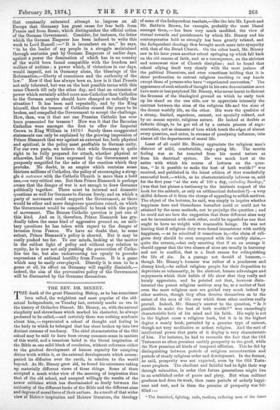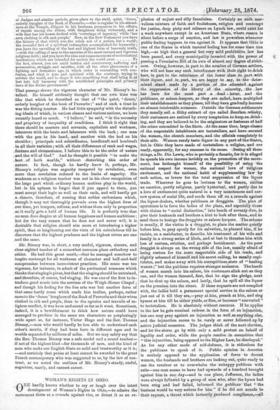THE REV. DR. BINNEY.
THE death of the great Dissenting Bishop, as he has sometimes been called, the weightiest and most popular of the old- school Independents, on Tuesday last, certainly marks an era in the history of Orthodox Dissent. Mr. Binney, as, with the natural simplicity and shrewdness which marked his character, he always preferred to be called,—and certainly there was nothing academic about him, — represented a school of thought and feeling in the body to which he belonged that has since broken up into two distinct streams of tendency. The chief characteristics of the Old school may be said to have been strong common-sense in matters of this world, and a tenacious belief in the literal inspiration of the Bible as one solid block of revelation, without reference either to the gradual development of human capacity for accepting divine truth within it, or the external developments which accom- panied its diffusion over the earth, in relation to the world beyond. As Mr. Binney grew old, he found his successors taking up materially different views of these things. Some of them accepted a much wider view of the meaning of inspiration than that of the old school, and accepted willingly the results of the newer criticism which has discriminated so freely between the authority of the different books of the Bible and the different aims and degrees of moral force of their authors. As a result of that wider iiew of Hebrew inspiration and Hebrew literature, the theology
of some of the Independent teachers,—like the late Mr. Lynch and Mr. Baldwin Brown, for example, probably the most liberal amongst them, — has been very much modified, the view of eternal rewards and punishments by which Mr. Binney and his contemporaries held so strongly has been greatly relaxed, and the Independent theology thus brought much more into sympathy with that of the Broad Church. On the other hand, Mr. Binney saw in his later years another school springing up which fell back on the old canons of faith, and as a consequence, on the strictest and narrowest view of Church discipline ; and he found that school allying itself very closely with the most jealous of the political Dissenters, and even sometimes holding that it is sheer profanation to entrust religious teaching to any hands except those of persons who have "experienced conversion." The appearance of such schools of thought in his own denomination must have more or less perplexed Mr. Binney, who never learnt to distrust the firmness of the theological ground on which he early took up his stand on the one side, nor to appreciate intensely the contrast between the aims of the religious life and the aims of the decent worldly life, on the other. His were the qualities of a strong, limited, sagacious, earnest, not specially refined, and by no means mystic, religious nature. He looked at doubts as definite things, to be got rid of by a certain process of argu- mentation, not as elements of haze which touch the edges of almost every question, and enter, in streams of paralysing influence, into almost all the departments of moral life.
Least of all could Mr. Binney appreciate the religious man's distrust of solid, comfortable, easy - going life. The ascetic feeling was as far removed from his moral nature as from his doctrinal system. He was much hurt at the satire with which his course of lectures on the ques- tion, " Is it possible to make the best of both worlds ?" was received, and published in the latest edition of that wonderfully successful book,—which, as he characteristically informs us, sold for the first year "at the rate of 100 a day, excluding Sundays," (was that last phrase a testimony to the intrinsic respect of the book for the sabbath, or only an arithmetical deduction ?)—a very skilful defence of it from the charge of appealing to selfish motives. The object of the lectures, he said, was simply to inquire whether happiness here and blessedness hereafter could or could not be attained by the same methods, not to prejudge the question ; and he could not see how the suggestion that these different aims may not be inconsistent with each other, could be regarded as one that ought to have no weight with reasonable beings. He was not hinting that if religious duty were found inconsistent with earthly happiness, — as he admitted it sometimes is,—the claim of reli- gious duty should be even compared with the earthly claim,— quite the reverse,—but only asserting that if on an average it should appear that the two classes of aims are usually in harmony and not in conflict, that is a fresh reason for relinquishing the life of sin. In a passage not devoid of humour,— though Mr. Binney's humour was rather of a ponderous and clumsy kind,—he rallied religious people for their disposition to depreciate so vehemently, in the abstract, human advantages and enjoyments which their habits of life show that they really and keenly appreciate, and he pointed out that, however disin- terested the purest religious motives may be, as a matter of fact even the most religious men are guided very much indeed by other motives, though they often deceive themselves as to the extent of the area of life over which these other motives really prevail. Indeed, Mr. Binney's answer to the question, " Is it possible to make the best of both worlds?" was exceedingly characteristic both of his mind and his faith. His reply is not in the highest sense a religious book, but it is in the highest degree a manly book, pervaded by a genuine type of earnest, though not very meditative or ardent religion. And the sort of intellectual power that parts of it display is very characteristic of him. For instance, he had to reconcile the fact that the Old Testament so often promises earthly prosperity to the good, while the New promises all kinds of temporal affliction. This he did by distinguishing between periods of religious reconstruction and periods of steady religious order and development. In the former, he said, prosperity was not expected, even by the Old Testa- ment prophets. The obedient and faithful had to fight their way through calamities, in order that future generations might live in an established order of peace and piety. But when militant goodness had done its work, then came periods of orderly happi- ness and rest, and in these the promise of prosperity was ful- filled :- " The famished, fighting, rode, restless, suffering man of the times
of Judges and similar periods, gives place to the staid, quiet, donee,' orderly burgher of the Book of Proverbs,—who is regular in his attend- ance at the Temple, diligent in his business, prosperous in his affairs, of repute among the elders, with daughters doing virtuously, and a wife that has his house decked with coverings of tapestry,' while ' her own clothing is silk and purple.' Now, in the New Testament you have the history of that which was the crisis not of a nation, but a world ; the revealed fact of a spiritual redemption accomplished for humanity ; you have the unveiling of the last and highest form of heavenly truth, —with the calling of men to the exercise of the most earnest and vigorous religious faith ; and you have the idea and commencement of ecclesiastical
institutions which are intended for society the world over To the last, almost, you are amid battles and controversy, suffering and persecution, struggle and sacrifice, with all the other phenomena of a fighting and formative age, in which order is contending with con- fusion, and what is true and spiritual with the contrary, trying to subdue the world, and to shape it into something that shall bring it at last into full harmony with the established principles and primary laws of the divine government."
That passage shows the vigorous character of Mr. Binney's in- tellect. He himself evidently thought that our own time was like that which be described as that of "the quiet, ' donee,' orderly burgher of the book of Proverbs ;" and of such a time he was the fitting teacher. He had little sympathy with the disturb- ing ideals of which, in various classes and various nations, we have recently heard so much. "I believe," he said, "in the necessity and propriety of inequality of conditions. I think it right that there should be masters and servants, capitalists and workmen, labourers with the brain and labourers with the back ; one man with the pen in his hand, and another with the hod on his shoulder ; principals and subordinates, handicraft and headcraft in all their varieties ; with all their differences of rank and wages, fortune and circumstance, I believe this to be the order of nature and the will of God." And he thought it possible " to make the best of both worlds," without disturbing this order of nature. In fact, though he hardly knew it, perhaps, Mr. Binney's religion was sagacity tempered by revelation, even more than revelation reduced to the limits of sagacity. His weakness as a religious teacher was not in his clear recognition of the large part whioh ordinary human motives play in the world, but in his aptness to forget that if you appeal to them, you must accept their logic as well as their ends, and will hardly get a chance, therefore, of rousing that nobler enthusiasm which, though it may not thoroughly pervade even the highest lives of our time, yet tempers, softens, and widens them only in proportion as it really gets a hold of human life. It is perfectly true that no man does despise at all human happiness and human ambitions ; but for the very reason that he does not and never will, it is desirable that religion should aim more at introducing a higher spirit, than at lengthening out the vista of his calculations till he discovers that the highest prudence and the highest virtue are one and the same.
Mr. Binney was, in short, a very useful, vigorous, sincere, and clear-sighted teacher of a somewhat common-place orthodoxy and ethics. He had this great merit,—that he managed somehow to inspire contempt for all weakness of character and half-and-half compromises between inconsistent practices. His sense was too vigorous, for instance, to admit of the puritanical nonsense which thinks that singing is pious, but that the singing should be untrained, and therefore, of course, bad singing. He was one of the first to in- troduce good music into the services of the Weigh-House Chapel ; and though his feeling for the fine arts was but another form of that same hardy sense which made him incline, perhaps, rather more to the ' deuce' burghers of the Book of Proverbs and their wives clothed in silk and purple, than to the agonies and travails of re- ligious conflict, it was keen and sound so far as it went. Sometimes, indeed, it is a bewilderment to think how nature could have managed to produce in the same era characters so perplexingly wide apart as, for instance, Victor Hugo and the Rev. Thomas Binney,—men who would hardly be less able to understand each other's merits, if they had been born in different ages and in worlds separated by millions of miles. But we may safely say that the Rev. Thomas Binney was a safe model and a sound teacher— if notof the highest kind—for thousands of men, and the kind of men who make our English State so solid and trustworthy as it is; —and certainly that praise at least cannot be awarded to the great French contemporary who was suggested to us, by the law of con- trast, as we noted the outlines of Mr. Binney's steady, useful, sagacious, manly, and earnest career.



































 Previous page
Previous page